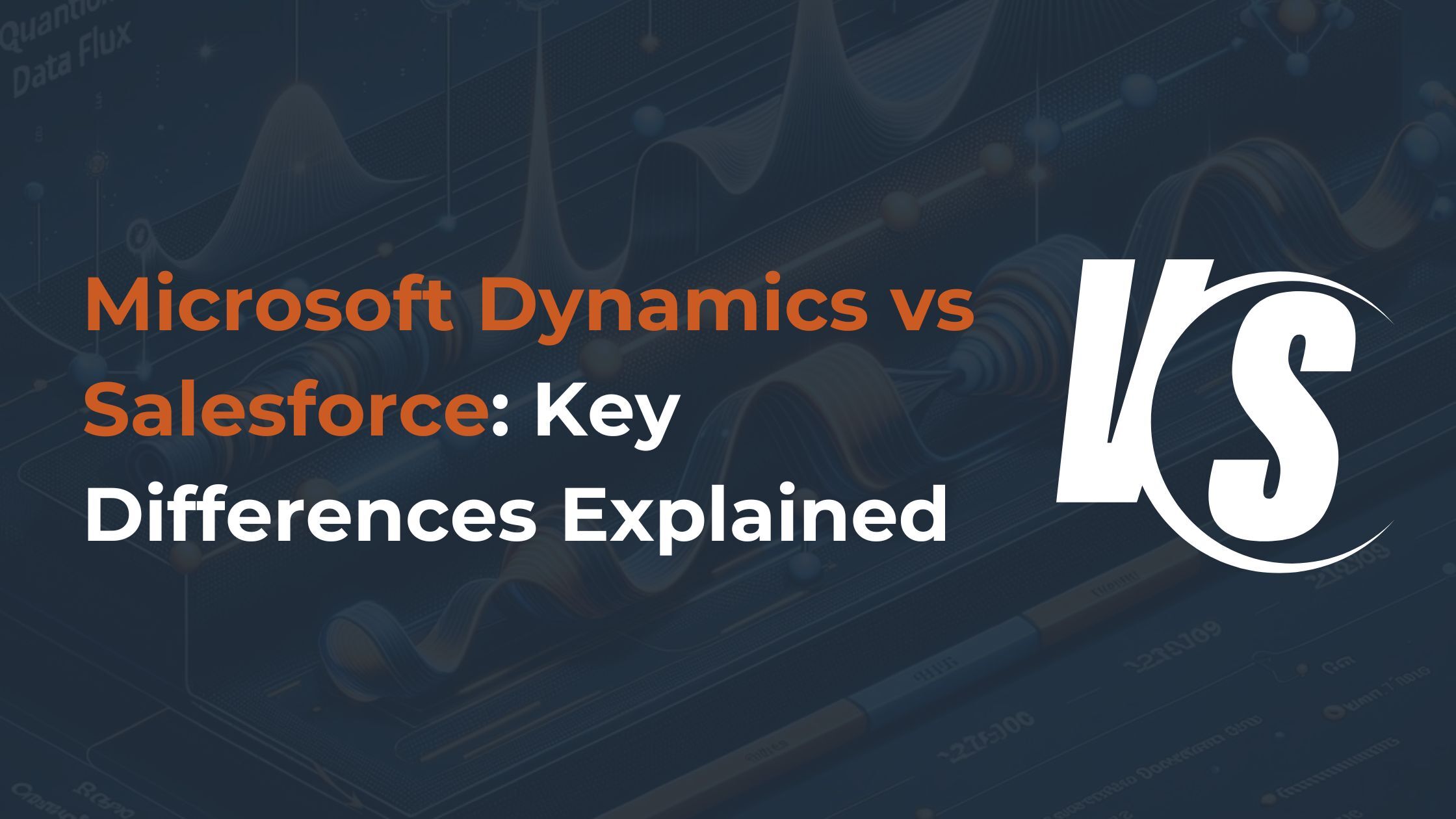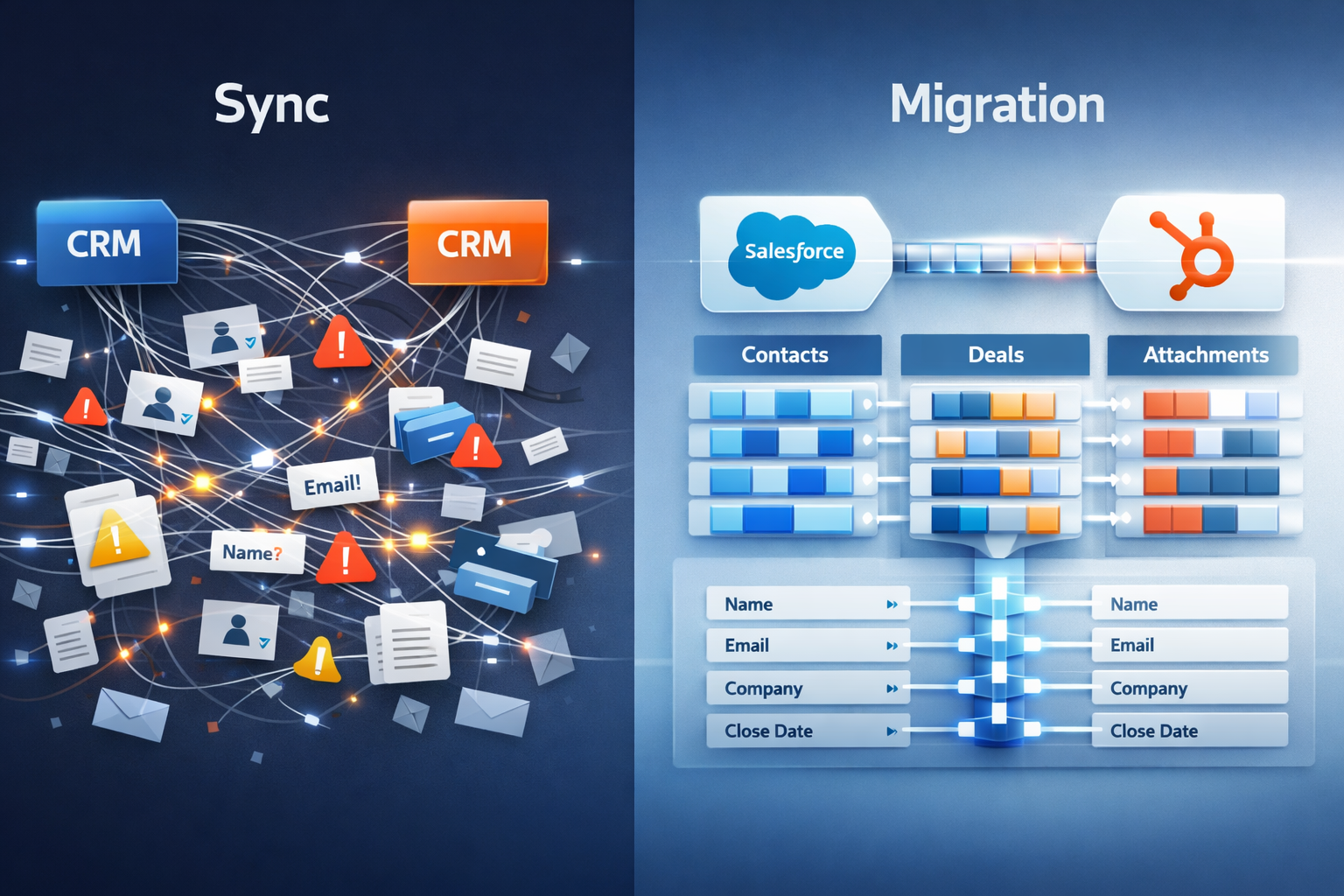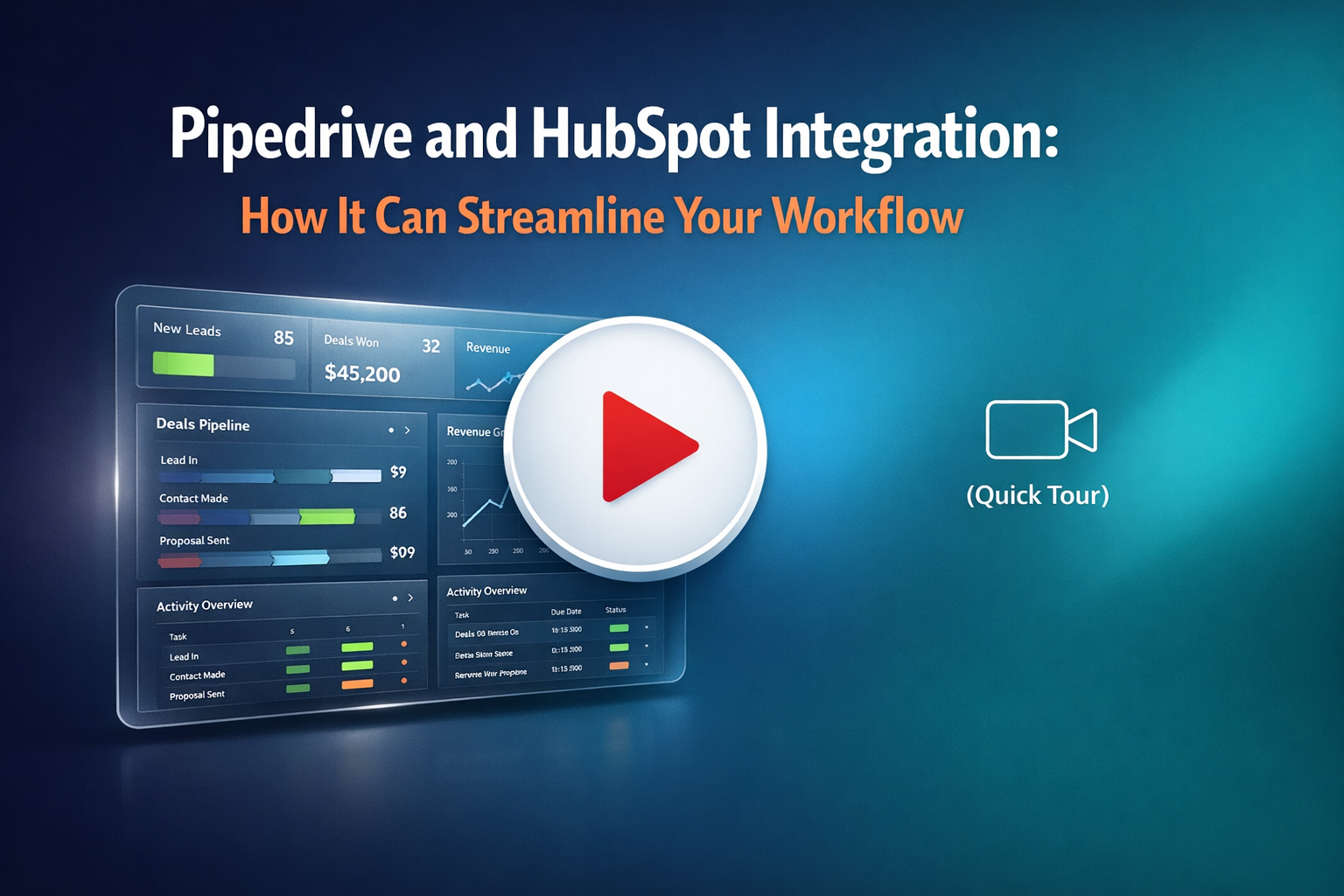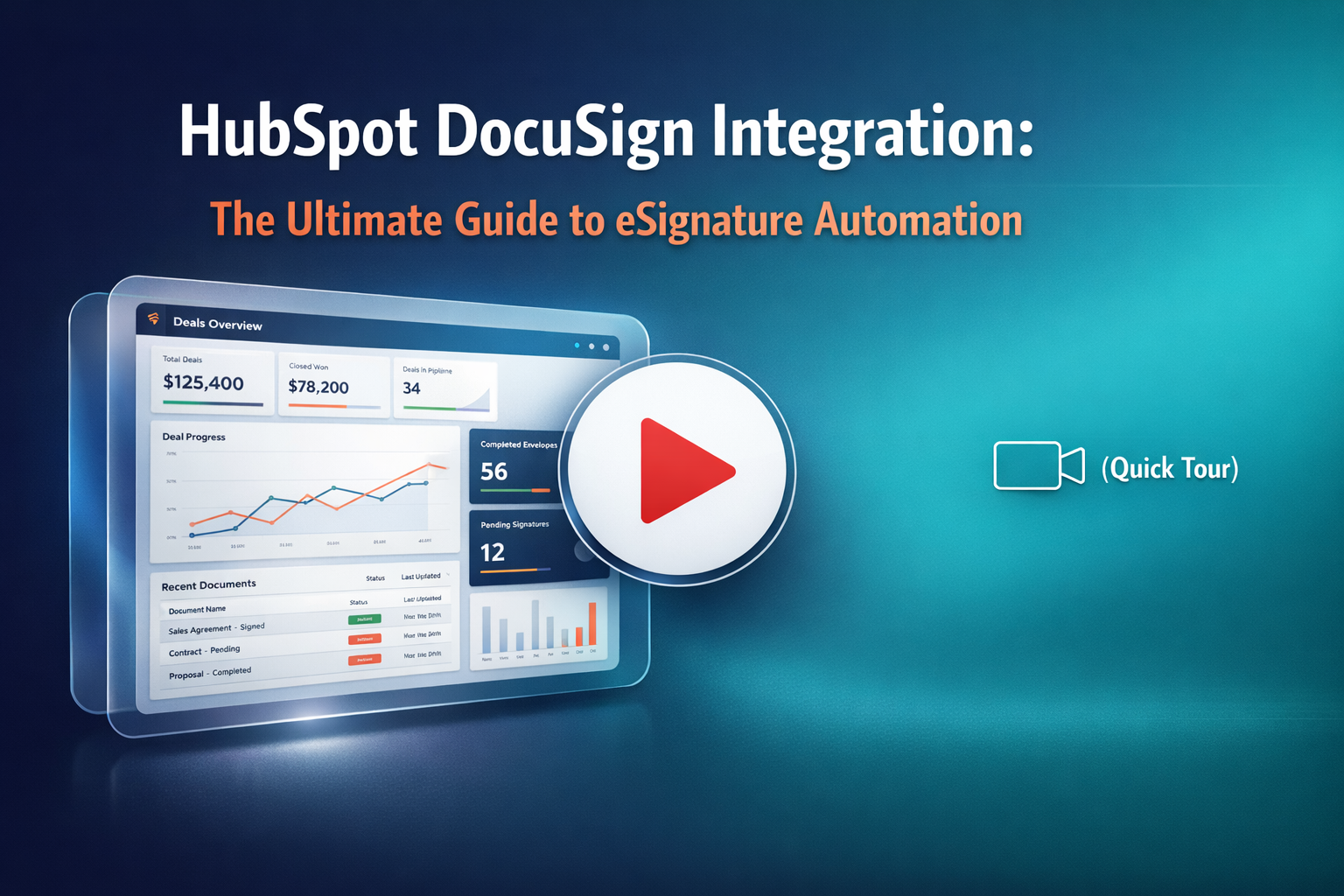Our article compares Microsoft Dynamics 365 and Salesforce, highlighting key differences in features, pricing, integrations, and usability.
- Dynamics 365 is cost-effective for Microsoft-centric companies, excelling in AI-driven workflows, ERP integration, and native compatibility with Outlook, Teams, and Azure.
- Salesforce offers unmatched customization, a vast AppExchange marketplace, and advanced AI (Einstein, Agentforce), making it ideal for sales- and marketing-driven businesses.
Both CRMs provide robust customer service, security, and mobile apps, but differ in pricing models and ecosystems. The best choice depends on whether a company prioritizes Microsoft integration and cost-efficiency or flexibility and scalability.
Want to see which CRM fits your business best? Read the full comparison!
Table of Content
- Microsoft Dynamics vs Salesforce: Understanding the CRM Giants
- Core Features Comparison: Dynamics CRM vs Salesforce
- Pricing and Licensing
- Integration and Ecosystem: Microsoft CRM vs Salesforce
- User Experience and Interface: Comparing Salesforce and Dynamics
- Security and Compliance
- Choosing the Right CRM: Salesforce vs Microsoft Dynamics
- Conclusion: Making an Informed CRM Choice
- FAQ
Microsoft Dynamics vs Salesforce: Understanding the CRM Giants
Before we dive into the Microsoft Dynamics vs Salesforce comparison, let`s look at their general overviews.
Microsoft Dynamics Overview

Microsoft Dynamics 365 CRM (often referred to as MS Dynamics) is a cloud-based solution that enables growing companies to organize data and strengthen customer engagement. It’s built to simplify sales processes while improving overall relationship management.
Dynamics 365 offers many different modules, but here are four key business functions:
- Sales and Marketing: AI-driven tools that support lead generation, pipeline management, and customer relationship building.
- Customer Service: A comprehensive platform that leverages AI insights to assist sales teams, support agents, and field service professionals in delivering better customer experiences.
- Finance: A finance and operations hub with real-time reporting and analytics to ensure projects are delivered efficiently, on schedule, and within budget.
- Supply Chain: AI-enabled features for demand forecasting, territory planning, and supply chain optimization to boost operational performance.
All modules are fully integrated, giving businesses a unified system that connects different departments. Still, each application can also be deployed independently, depending on organizational needs.
For instance, sales teams typically rely on Dynamics 365 Sales to manage opportunities and customer interactions, while larger enterprises may integrate additional apps to cover finance, operations, or supply chain management.
Salesforce Overview

Salesforce CRM is a cloud-based platform that equips businesses with tools to strengthen customer relationships across sales, marketing, service, and e-commerce. Built with scalability in mind, Salesforce helps fast-growing organizations centralize, monitor, and analyze customer data. It also supports integrations from virtually any source, giving teams a unified, 360-degree view of both existing clients and potential leads.
Similar to Microsoft Dynamics 365, Salesforce is highly flexible. Companies can begin with a single core solution and then add more modules as their business grows. Its suite of products covers:
- Boosting sales efficiency, managing pipelines, and closing deals
- Running tailored marketing campaigns
- Enhancing customer support and service delivery
- Automating workflows to streamline operations
Beyond its core features, Salesforce offers AppExchange, a vast marketplace with thousands of third-party applications that extend functionality even further.
While its integration potential is a major strength, the platform’s wide scope can also make it complex, requiring time and training to master effectively.
Compare Microsoft Dynamics CRM and Salesforce to choose the best option at the end of the article!
Core Features Comparison: Dynamics CRM vs Salesforce

Our detailed Microsoft Dynamics vs Salesforce feature comparison highlights differences in sales, marketing, customization, and customer support to help businesses choose the right CRM.
Sales and Marketing Capabilities
Microsoft Dynamics 365 focuses on AI-driven sales enablement and tight integration with Microsoft’s ecosystem. Sales teams benefit from predictive lead scoring, opportunity insights, and relationship analytics that show which deals are most likely to close. Guided selling tools provide step-by-step recommendations, ensuring sales reps follow best practices consistently. On the marketing side, Dynamics enables teams to segment audiences, create personalized campaigns, and track customer journeys across email, social, and events.
Salesforce is considered a leader in sales automation and multi-channel marketing. The Sales Cloud includes robust tools for pipeline management, sales forecasting, territory planning, and performance tracking, helping managers and reps stay on top of every stage of the customer journey. Its Einstein AI enhances these processes with predictive insights, recommending next steps and highlighting the most promising leads. For marketing, Salesforce offers the Marketing Cloud, a powerful platform for building personalized, data-driven campaigns across email, SMS, social media, and even e-commerce touchpoints. Advanced segmentation and automation tools make it possible to deliver the right message at the right time, boosting engagement and conversions.
Customer Service and Support Tools
Microsoft Dynamics 365 provides extensive resources to help users troubleshoot issues and make the most of its platform. The product documentation library includes detailed tutorials, guides, and step-by-step instructions, while the Dynamics 365 Community allows users to exchange insights, ask questions, and participate in user groups.
When self-service options aren’t enough, Microsoft offers three structured support tiers:
- Standard: Best suited for organizations with straightforward setups or those working through a full-service partner.
- Professional Direct: Designed for companies running more complex operations, offering quicker response times and access to product experts.
- Unified Enterprise: A premium option that delivers all-inclusive support across multiple Microsoft products, ideal for large enterprises.
All tiers provide 24/7 assistance for critical incidents (such as outages) along with web and phone-based case submissions. Businesses that require more advanced technical help can also upgrade to a paid support plan.
Salesforce gives users several ways to resolve issues, starting with its help center, which includes product documentation, how-to articles, and a searchable knowledge base. For hands-on guidance, however, businesses need to subscribe to a Success Plan, with the right plan depending on the level of expertise and speed of support required.
- Standard Success Plan: Includes on-demand resources plus round-the-clock technical support.
- Premier Success Plan: Adds priority access to Salesforce engineers and personalized assistance from product specialists.
- Signature Success Plan: The highest level, featuring 24/7 access to senior support engineers, a dedicated emergency hotline, and a Customer Success Manager (CSM) for strategic guidance.
Also, in this Salesforce vs Microsoft Dynamics comparison guide, we should mention that Salesforce offers its AI agent called Agentforce. Agentforce is Salesforce’s native framework for building intelligent, autonomous agents within the CRM ecosystem. These agents are more than just chatbots because they understand business context, act on Salesforce data, and execute workflows using Apex, Flows, and APIs.
Customization and Flexibility
One of Dynamics 365’s strengths is its modular structure. Businesses can start small, using just sales or service, and then expand into finance, supply chain, or field service as they grow. Its workflows, dashboards, and forms can be tailored without heavy coding, making it approachable for non-technical users. More advanced customization is possible through Microsoft Power Platform, which lets companies build custom apps, automate complex workflows, and create sophisticated reports. For businesses already embedded in Microsoft’s ecosystem, Dynamics offers smooth integration with Azure services and Microsoft 365 tools.
Salesforce stands out for its extensive customization options. Through the Lightning Platform, businesses can design custom objects, workflows, and apps to fit their unique processes. Its AppExchange marketplace includes thousands of third-party applications that extend functionality for industries ranging from healthcare to finance. Salesforce also provides robust APIs for integrating external systems, making it a strong fit for enterprises with complex tech stacks. However, its flexibility comes with a learning curve; organizations often need dedicated Salesforce administrators or developers to configure and maintain custom setups effectively.
Look at the clear Salesforce vs Microsoft Dynamics comparison chart to summarize all the information.
|
Category |
Microsoft Dynamics 365 |
Salesforce |
|
Best For |
Companies already invested in Microsoft tools, enterprises seeking end-to-end business management |
Organizations needing advanced sales automation, marketing personalization, and maximum CRM flexibility |
|
Rating based on Capterra ⭐ (out of 5) |
⭐⭐⭐⭐ (4.4) |
⭐⭐⭐⭐ (4.4) |
|
Key Features |
|
|
|
Customer Support |
|
|
|
Customization |
|
|
Pricing and Licensing

Overview of Pricing Models
Both Microsoft Dynamics 365 and Salesforce operate on subscription-based pricing models, but they structure their offerings differently.
Microsoft Dynamics 365 takes a modular approach, allowing businesses to purchase only the apps they need (e.g., Sales, Customer Service, Marketing, Field Service). Pricing is typically per user, per app, and additional discounts may apply when bundling multiple modules together. This flexibility makes Dynamics appealing to businesses that want to start small and scale features as they grow.
Microsoft structures Dynamics 365 plans to suit different business sizes and needs:
- Dynamics 365 Sales free trial
- Sales Professional: $65 per user/month
- Sales Enterprise: $105 per user/month
- Sales Premium: $150 per user/month
- Dynamics 365 Customer Service free trial
- Customer Service Professional: $50 per user/month
- Customer Service Enterprise: $105 per user/month
- Customer Service Premium: $195 per user/month
- Dynamics 365 Finance: $210 per user/month
- Dynamics 365 Finance Premium: $300 per user/month
Salesforce offers a tiered licensing model with plans ranging from basic to enterprise-grade. Each tier includes a different level of functionality, and higher tiers unlock advanced automation, AI features, and customization. Businesses usually pay per user, per month, and can add extra costs through Marketing Cloud, Service Cloud, or AppExchange integrations.
Salesforce follows a tiered pricing model with annual billing:
- Sales Starter Suite: $25 per user/month
- Sales Pro Suite: $100 per user/month
- Sales Enterprise: $175 per user/month
- Sales Unlimited: $350 per user/month
- Agentforce 1 Sales: $550 per user/month
- Marketing Cloud Starter Suite: starting at $25 per user/month
- Service Cloud: starting at $25 per user/month
Cost Considerations for Businesses
When evaluating Microsoft Dynamics CRM vs Salesforce the total cost of ownership, companies need to look beyond subscription fees and factor in hidden or long-term expenses.
Microsoft Dynamics 365 may provide better value for organizations already using Microsoft products. Licensing can be more affordable if bundled with existing Microsoft solutions. However, costs may increase with add-ons such as Power Automate or advanced analytics through Power BI.
Salesforce often comes with a higher upfront price tag, particularly for advanced tiers like Enterprise and Unlimited. While its ecosystem is powerful, many businesses find themselves investing in additional third-party apps, dedicated administrators, or consulting partners to get the most out of the platform. Over time, this can raise the overall investment significantly.
In short, Dynamics 365 is generally more cost-effective for Microsoft-centric organizations seeking modular growth, while Salesforce tends to be pricier but delivers unmatched scalability and third-party ecosystem support. Businesses should weigh not only licensing fees but also implementation, customization, training, and ongoing support costs when comparing the two.
|
Aspect |
Microsoft Dynamics 365 |
Salesforce |
|
Sales Plans |
|
|
|
Customer Service Plans |
|
|
|
Other Plans |
|
|
|
Cost Considerations |
More cost-effective for Microsoft-centric companies. Bundles with Office 365/Power BI can reduce costs. Add-ons (Power Automate, analytics) increase expenses. |
Generally more expensive at higher tiers. Additional costs often needed for third-party apps, admins, and consulting support. |
Integration and Ecosystem: Microsoft CRM vs Salesforce

Both Microsoft Dynamics 365 and Salesforce go beyond being standalone CRMs; they function as part of a larger ecosystem. Microsoft Dynamics CRM vs Salesforce's ability to integrate with other platforms, apps, and business tools plays a major role in how well they fit into an organization’s workflow.
Third-Party Integrations and App Marketplaces
Dynamics 365 offers a strong integration framework, especially when paired with the Power Platform. This ecosystem makes it easier for businesses to build custom workflows, connect data sources, and automate processes across different departments. While Dynamics has an app marketplace, called Microsoft AppSource, it’s smaller than Salesforce’s AppExchange but still provides industry-specific extensions and add-ons. Its key advantage lies in the native compatibility with other Microsoft products, reducing the need for third-party solutions in many cases.
Salesforce is known for its AppExchange, one of the largest enterprise app marketplaces available. With thousands of third-party integrations, it allows businesses to extend functionality across industries such as healthcare, finance, retail, and more. From marketing automation and analytics to compliance tools, AppExchange provides ready-to-install apps that help companies customize Salesforce to their exact needs. The breadth of this ecosystem is one of Salesforce’s biggest competitive advantages, though it can also add complexity when businesses adopt too many add-ons.
Compatibility with Existing Business Tools
The biggest selling point for Dynamics is how well it integrates with Microsoft 365 (formerly Office 365) tools such as Outlook, Teams, Excel, and SharePoint. This makes collaboration seamless, as sales reps can log CRM data directly from Outlook or analyze pipelines in Excel without leaving the Microsoft environment. For organizations already committed to Microsoft’s software stack, Dynamics 365 feels like a natural extension rather than a separate system.
Salesforce is more tool-agnostic, integrating with a wide variety of external business applications through APIs and connectors. It can sync with productivity platforms like Google Workspace, Slack, and Zoom, as well as ERP systems like SAP and Oracle. The acquisition of Slack further strengthened Salesforce’s ecosystem by embedding real-time collaboration into its CRM workflows. However, many of these integrations require setup or third-party middleware like SyncMatters to work smoothly.
User Experience and Interface: Comparing Salesforce and Dynamics

Usability is a very critical aspect of the Microsoft CRM vs Salesforce comparison. Let`s figure it out!
Ease of Use and Learning Curve
Microsoft Dynamics 365 and Salesforce are both robust CRM platforms packed with advanced capabilities. While powerful, their depth means that users often need time and sometimes expert guidance to become fully proficient. Dynamics 365 offers a familiar interface for those already using Microsoft products like Outlook or Office 365, which helps shorten the adjustment period. Its design is streamlined, presenting only the most relevant information, and layouts can be tailored through a drag-and-drop editor without requiring coding skills.
That said, the platform’s wide array of tools can be overwhelming, especially for newcomers. Many organizations choose to work with a certified Microsoft Partner to properly configure and optimize their CRM platform. Add-ons like Power Automate also enhance usability by handling repetitive processes and streamlining workflows.
Salesforce’s Sales Cloud emphasizes accessibility with a clean interface, intuitive navigation, and customizable drag-and-drop components. Still, much like Dynamics, its extensive feature set can feel daunting to beginners. To ease adoption, businesses often rely on Salesforce consulting partners for setup and training. For those who prefer self-learning, Trailhead (Salesforce’s online training hub) offers a wide selection of interactive courses to help users build skills at their own pace.
Mobile Access and Remote Capabilities
Microsoft provides mobile apps for both smartphones and tablets, making it easy for teams to stay connected with customers while away from the office. The mobile platform is especially valuable for field service representatives who need real-time access to client information and workflows. However, because it includes a wide range of features, the interface can feel dense or overwhelming for new users.
Salesforce delivers a highly polished and user-friendly mobile CRM app that stands out for its intuitive design. Powered by Einstein AI, it brings business intelligence directly to mobile users, offering predictive insights and smart recommendations. Beyond core CRM tasks, the app supports email marketing, lead tracking, and case management, while also providing strong customization options to adapt to specific business needs.
Security and Compliance

Data Protection and Privacy Measures
When comparing Dynamics CRM vs Salesforce security, both CRMs treat data security as a top priority, offering enterprise-grade protection to safeguard sensitive customer information.
Microsoft Dynamics 365 relies on Microsoft’s Azure infrastructure, which provides advanced security capabilities such as multi-factor authentication, role-based access controls, data encryption (both at rest and in transit), and continuous monitoring for suspicious activity. Organizations also benefit from Microsoft’s global network of secure data centers, ensuring redundancy and resilience.
Salesforce also provides robust protection with features like field-level security, identity verification, real-time event monitoring, and encrypted communications. Its built-in security architecture ensures that users only access the data they are authorized to see, while Salesforce Shield offers additional layers like platform encryption, audit trails, and monitoring for compliance-heavy industries.
In both platforms in our Microsoft CRM vs Salesforce comparison, administrators can configure security settings to align with internal policies, ensuring data privacy is maintained across the customer lifecycle.
Regulatory Compliance Standards
Regulatory compliance is another critical area where Microsoft Dynamics 365 and Salesforce excel, enabling businesses in different industries to meet strict legal and industry requirements.
Microsoft Dynamics 365 is compliant with numerous global standards, including GDPR, HIPAA, ISO 27001, and SOC 1 & 2. Microsoft regularly updates its compliance portfolio to support organizations in industries such as healthcare, finance, and government, where regulations are especially strict.
Salesforce also meets a wide range of compliance certifications, including GDPR, HIPAA, FedRAMP, ISO 27001, and PCI DSS. Its Trust and Compliance documentation provides transparency into how data is managed, stored, and protected, making it easier for businesses to demonstrate compliance during audits.
Both platforms provide tools and documentation to help businesses align their CRM use with internal governance, risk, and compliance (GRC) strategies, reducing the burden of regulatory obligations while maintaining customer trust.
Choosing the Right CRM: Salesforce vs Microsoft Dynamics

Factors to Consider for Your Business
When deciding Salesforce vs Dynamics, businesses should weigh several key factors:
- Budget and Pricing Structure: Salesforce typically incurs higher subscription costs, particularly when adding advanced features or premium support plans. Dynamics 365, while still enterprise-level, often provides more flexible pricing and bundling options, particularly for businesses already invested in Microsoft products.
- Ease of Use: Salesforce is praised for its intuitive interface and user-friendly navigation, though its broad functionality can feel overwhelming for beginners. Dynamics 365 has a familiar Microsoft-style interface, making it easier for Office 365 users, but still requiring training due to its complexity.
- Integration Needs: Dynamics CRM vs Salesforce integration is a little bit different. If your business relies on Microsoft tools (Outlook, Teams, Excel, SharePoint), Dynamics 365 offers seamless native integration. Salesforce, on the other hand, shines with its AppExchange marketplace, which provides thousands of third-party apps across diverse industries.
- Customization: Both platforms are highly customizable, but Salesforce offers unmatched flexibility through its Lightning Platform and APIs. Dynamics provides strong customization via the Power Platform, which is particularly advantageous for businesses already embedded in Microsoft’s ecosystem.
- Scalability and Growth: Salesforce is often favored by rapidly scaling businesses due to its wide ecosystem and global adoption. Dynamics 365’s modular design makes it easier for businesses to start small and gradually add functionalities as needs evolve.
Industry-Specific Recommendations
In our Salesforce vs Dynamics comparison, we should highlight that both CRMs serve a broad range of industries, but certain strengths make each platform more appealing to specific sectors.
Salesforce is suited for industries that thrive on customer engagement and multi-channel communication, such as retail, e-commerce, technology, and financial services. Its Marketing Cloud, AI-driven insights, and deep customization make it ideal for customer-centric organizations that rely on tailored interactions.
Microsoft Dynamics 365 is a strong choice for industries with complex operational needs, such as manufacturing, healthcare, government, and logistics. Its close integration with ERP systems, supply chain modules, and Microsoft’s productivity suite makes it especially effective for businesses that require both CRM software and operational management in one ecosystem.
Conclusion: Making an Informed CRM Choice

|
Aspect |
Microsoft Dynamics 365 |
Salesforce |
|
User Experience |
Familiar to Microsoft users, but a steeper learning curve |
Sales Cloud is more intuitive, cleaner, and easier to onboard |
|
Ecosystem & Integrations |
Best with Microsoft tools (Office, Teams, Azure) |
Largest third-party ecosystem (AppExchange, 7,000+ apps) |
|
AI & Automation |
Strong automation with Power Automate, AI via Copilot |
Advanced Einstein AI, predictive analytics, automation at scale |
|
Industry Fit |
Excellent for manufacturing, finance, healthcare (ERP + CRM software combo) |
Strong in sales-driven, marketing-heavy industries |
|
Scalability |
Modular growth, good for Microsoft-centric scaling |
Enterprise-level scalability, global ecosystem support |
|
Total Cost of Ownership |
Cost-effective if bundled with the Microsoft stack |
Higher upfront + hidden costs (customization, consultants) |
|
SyncMatters Rating |
⭐⭐⭐⭐(4.5/5) |
⭐⭐⭐⭐ (4.7/5) |
Both Microsoft Dynamics 365 and Salesforce are powerful CRM solutions. Dynamics 365 stands out for businesses already invested in the Microsoft ecosystem, offering modular growth and tight integration with familiar tools like Office 365 and Power BI. Salesforce, on the other hand, excels in scalability, advanced automation, and its vast third-party ecosystem, making it a strong option for organizations that want a fully customizable platform with extensive capabilities.
When you compare Salesforce and Microsoft Dynamics CRM, consider not just pricing but also ease of use, integration with existing systems, and the level of customization and support your team will need.
If you’re still unsure which CRM solution is the best fit, SyncMatters can help. As an integration expert, SyncMatters makes it easier to connect your CRM system with the rest of your tech stack, ensuring smooth data flows and maximum return on your CRM investment. Don`t worry about integration challenges! Contact us for a free consultation!
FAQ
What are the main differences between Microsoft Dynamics and Salesforce?
The key difference between Microsoft Dynamics and Salesforce is that Microsoft Dynamics seamlessly connects with the broader Microsoft suite, giving users strong customization options and the choice between on-premise or cloud deployment. In contrast, Salesforce is a cloud-native CRM system built for scalability and ease of use, supported by one of the largest app marketplaces in the industry. Dynamics is an ideal fit for organizations already invested in Microsoft tools, while Salesforce stands out for its cloud-first approach and expansive third-party ecosystem.
What is the market share of Salesforce vs Dynamics?
When we compare Salesforce and Microsoft Dynamics CRM, Salesforce remains the global CRM leader, holding over 20% of the CRM market share, making it the most widely adopted platform worldwide. Microsoft Dynamics 365 has a smaller share (around 3–8% depending on the source), but it is steadily growing, especially among enterprises already using Microsoft tools.
How do Salesforce and Microsoft Dynamics pricing compare?
Both CRMs use a subscription-based model. Salesforce can be more expensive due to third-party add-ons and customization needs, while Dynamics is usually more cost-effective for Microsoft-heavy organizations.
Can Microsoft Dynamics and Salesforce integrate with other tools?
Yes. Both platforms offer extensive integration options. Dynamics 365 works best with Microsoft’s ecosystem. Salesforce has the largest app marketplace (AppExchange) with thousands of third-party solutions for nearly any business need. Additionally, both CRMs can connect to external platforms via APIs, iPaaS solutions like SyncMatters, or built-in integration tools.
Which CRM offers better reporting and analytics features: Microsoft Dynamics or Salesforce?
Both CRMs provide powerful reporting and analytics, but their strengths differ. Microsoft Dynamics leverages Power BI for advanced visualization and deep data analysis, which is ideal for businesses already invested in Microsoft’s analytics stack. Salesforce uses Einstein AI and built-in dashboards, offering predictive analytics and user-friendly insights directly within the platform.




